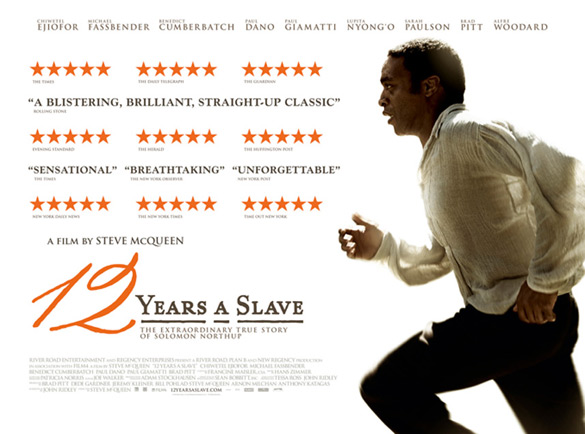LFF 2013: 12 Years A Slave ****
British artist turned director Steve McQueen (Shame) has crafted another beautiful-looking and moving film in 12 Years A Slave that has equally emotive subject matter. Naturally, a story dealing with slavery provokes revulsion, and here, is where reviewing such a film needs a separation of personal sentiments from actual empowering film-making. Indeed, the film feels all too similar in style to others tackling the same topic, but in McQueen’s defence, there is an unexpected, gradual build-up of anger that is overwhelmingly felt at the end, as well as the circumstances of its lead being different from the traditional tale.
Family man Solomon Northup (Chiwetel Ejiofor) is a free black man living upstate New York, revered for his professional musician talents. On the promise of work, Northup is abducted and sold into slavery one night, and taken by boat to the South. He is renamed and passed from owner to owner, ending up working on the lands of sadistic Edwin Epps (Michael Fassbender). Northup tries to get word to home, in the hope that he will be freed, after years have passed and he has routinely witnessed brutality and murder.
McQueen has cast very well in this, in British actor Ejiofor (2012, American Gangster and Children of Men), as well as in ‘muse’ Fassbender (Shame, Hunger) who is utterly vile and pitiful as Epps. The acting alone is exquisite and the reason for this film’s impact alone – the story is one told over and over. The afore-mentioned actors definitely deserve awards recognition, with much of the lingering camerawork centred on Ejiofor who carries the film with admirable confidence.
Another ‘tweak’ to the standard screen slavery story is focusing on one affluent man’s plight, but in a humbling manner that does not tub-thump the slavery issue or rely on constant titillating brutal actions for added effect. Indeed, when these do feature, they are aptly placed to enhance the situation at that given moment and are very difficult to watch.
What McQueen’s film focuses on more is psychological manipulation. There is a constant sense of anxiety for the lead, with every situation a potential hazard, even those which seem ‘harmless’: For example, Northup goes to the home of another landowner on an errand, where the mistress is black and taking tea. It is such a situation that raises highly intriguing questions on the whole debate and the highlights the disparity among the treatment of the black population at this time.
Overall, 12 Years A Slave feels loyal to the original story of the same name by the real Northup by making the experience a personal and faithful account, so much so that the end feeling of anger creeps up on you while watching the last scene at the waste of one man’s key years away from his growing family. In this sense, McQueen has reignited controversy without bowing to excessive measures on a grand scale.
4/5 stars
By @FilmGazer
